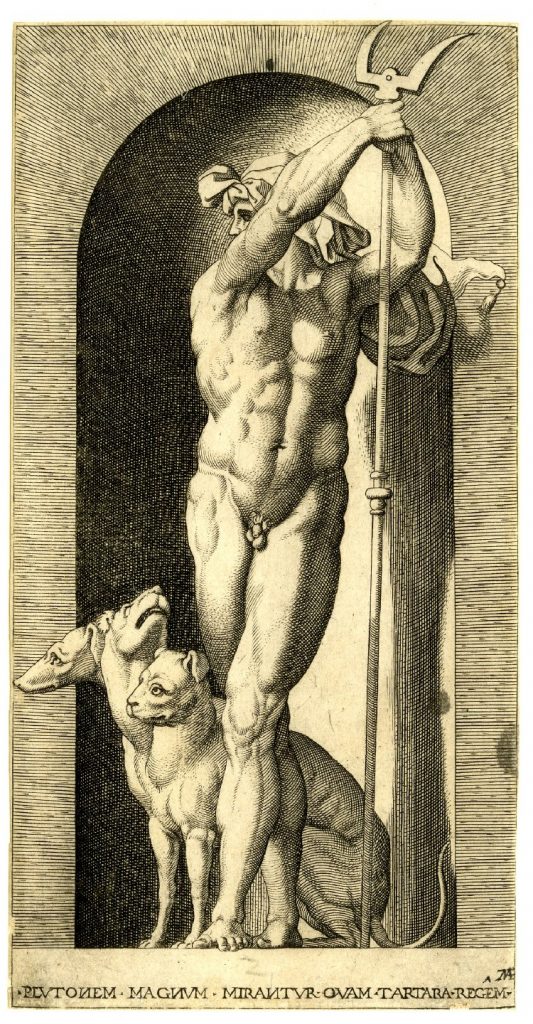More often than not, ancient Greek mythology (religion) served to explain a series of legends. Different from modern religions such as Christianity, Judaism, or Islam, ancient Greek religion was an anthropomorphic polytheism, meaning that ancient Greeks believed in a multitude of individual divine figures that took on human forms and emotions.1 Furthermore, ancient Greek mythology lacked much of the asceticism and mystical enthusiasm that is more commonly seen in modern religions. Most of the highly developed anthropomorphic and comparative rationalism of the ancient Greek religious thought can be accredited to Homer with the aid of his Iliad and Odyssey.2
The people of the ancient Greek civilization were often in a state of weakness under the power of nature; therefore, they relied heavily on the divine individuals of Olympus. Why? They believed that the forces of nature were under the control of their gods. In short, the relationship between humans and divine beings was that of a retribution justice.3 If humans did anything to offend the gods, then those gods would strike back in some sort of fashion to restore justice.4 Therefore, humans were constantly looking to please the gods in fear of their wrath.
Out of the ancient Greek mythology came the god of the dead and the underworld, Hades. Hades had five other siblings: Zeus, Poseidon, Demeter, Hera, and Hestia, and they were all children of Cronus and Rhea.5 After defeating their parents (the Titans), Hades drew lots with Zeus and Poseidon to gain their respective domains. Hades was commonly thought to be a cold god, but he was never considered to be an evil divine figure. Furthermore, it is important to note that his realm, the underworld, should not be associated with the hell of Christianity.6 However, Hades was for the most part feared by all. Another name for the ancient Greek god was Ploutos and later adopted by the Romans as Pluto.7

The god of the underworld was the husband of Persephone (Zeus’s and Demeter’s daughter). Although she was Hades’ wife, she only lived with him during the winter time.8 Persephone was the divine goddess of agriculture and fertility. Therefore, the ancient Greeks accredited the change in nature (winter) to Persephone moving to the underworld. Persephone was unable to stay with Hades at all times due to interference from her mother Demeter. Zeus, however, was okay with the marriage of Hades and Persephone. Therefore, in order to set up the marriage, Zeus had to trick Persephone, so she could be abducted by Hades.9 However, Demeter interfered, and that is why Persephone spends half of the year with Demeter and the other half with Hades.
Furthermore, it is important to note the Greek perspective of the afterlife. Perspectives about the afterlife varied from each other based on their region in Greece as well as their time period in Greek history. The consensus was that the underworld was neither heaven nor hell.10 The sense that exists within Christianity, for example, was not present during the time of the ancient Greeks. Although Tartarus was present as a location within the underworld, the Greeks would not compare it to the equivalent of Christian hell. The way the Greeks saw it, the underworld was a place that everyone ended up after death.11 However, there were a few, including the philosopher Epicurus, that believed that the underworld did not exist at all. He believed that when the body died, the soul died with the body as well.12 A good portion of Greeks refused to believe such a pessimistic perspective of the afterlife. However, even the Greek traditional perspective of the underworld was not as popular despite many Greeks believing in it.
- Funk & Wagnalls New World Encyclopedia, 2016 s.v., “Greek Religion and Mythology.” ↵
- Funk & Wagnalls New World Encyclopedia, 2016 s.v., “Greek Religion and Mythology.” ↵
- Funk & Wagnalls New World Encyclopedia, 2016 s.v., “Greek Religion and Mythology.” ↵
- Funk & Wagnalls New World Encyclopedia, 2016 s.v., “Greek Religion and Mythology.” ↵
- Salem Press Encyclopedia, January, 2015, “Hades (deity),” by Joseph, Michael, DMin. ↵
- Salem Press Encyclopedia, January, 2015, “Hades (deity),” by Joseph, Michael, DMin. ↵
- Salem Press Encyclopedia, January, 2015, “Hades (deity),” by Joseph, Michael, DMin. ↵
- Salem Press Encyclopedia, January, 2015, “Hades (deity),” by Joseph, Michael, DMin. ↵
- Salem Press Encyclopedia, January, 2015, “Hades (deity),” by Joseph, Michael, DMin. ↵
- The Greenhaven Encyclopedia of Ancient Greece, 2007, s.v. “Underworld,” by Robert B. Kebric. ↵
- The Greenhaven Encyclopedia of Ancient Greece, 2007, s.v. “Underworld,” by Robert B. Kebric. ↵
- The Greenhaven Encyclopedia of Ancient Greece, 2007, s.v. “Underworld,” by Robert B. Kebric. ↵



186 comments
Sergio Cervantes
I really enjoyed reading this article! It was so interesting learning about the Greek’s religion and the origins of it. In the past, I always thought that the underworld was a type of Christian hell, however, now I see it more clearly as the type of place it was. Another part that I found interesting was the whole story of Hades and his wife. It is fascinating to see how the Greeks explained the seasons of the year and their causes.
Alejandro Garza
Always love to read about mythology of any kind and this was no different. Although I’m already familiar with the story of how Hades came to be the ruler of his domain and his marriage to Persephone as well as the conditions of their marriage, its always nice to hear someone else’s retelling of the story. Greek mythology especially has always been a topic of interest for me to read and learn about especially the creation myths of their gods and goddesses exploits.
Samuel Sanchez
This was an interesting article. I was always interested in Greek Mythology. I always liked learning about but I never knew so much on Hades. It interesting how they perceived Hades in the Disney movie as a villain but in actuality he’s just a regular divine figure. I also did not know that the underworld, in the Greek’s perceptive, was not considered hell. Great topic very informative.
Jennifer Pogue
This article really interested me! It was very well written and had a wonderful flow throughout. I am mainly surprised to learn that the underworld is not the hell. From the Disney movie, Hercules, I gained the understand that they were the same. I also thought that Zeus and Hades were the only siblings, I had no idea that the five of them were siblings! This article truly gave me a new understanding of Greek mythology.
Aaron Mcglown
Very good article! Greek mythology has always been a interest of mine and Hades is my favorite god. Knowing he wasn’t the antagonist that i grew thinking he was, is a eye opener. You gave information that i didn’t know. The article was well written and understanding. Its hard to believe that back in the day this was a pretty serious belief system.
Elizabeth Garibay
Really interesting article! It was all great although I really liked how you made the point to show that Hades was not the ruler of hell although that’s how its been said in Christianity but only the in the afterlife. Also how to many people the closest analogue in Christianity to a “king of the underworld” would be Satan, though that’s not exactly the case in Catholic theology like I said about hades. Although everyone has their theories and suggestions. Great job!
Bailey Rider
I really love how you pointed out the differences between how the Greeks viewed the afterlife compared to Christians. It was new information to me that the Greeks didn’t view the Underworld as a hell but just as a place that everyone ended up it. I love reading about Greek Mythology because I like seeing how their Gods explain natural phenomenons. So I loved reading about how Persephone is the reason the seasons change. Excellent article!
Michael Aichler
This was a very informative article but I found a lot of things interesting. The fact that this article didn’t explain that when Persephone goes to live with Hades for 6 months, that is really the harvest. The reason that she is the goddess of fertility is also because she love pomegranates. Pomegranates represents (to the Greeks) women being fertile. Also Hades has a 3 headed dog named Cerberus. Other then that it was very well informative.
Good work!
George Manzanares
The reason the article did not touch base on Persephone was due to the fact that the main focus of the article lied elsewhere. In case you were not able to notice, my larger focus was an illustration of the differences in thought between modern religions and ancient Greek religions. How is it that contemporaries view the concept of death given a religious perspective? As explained in the last paragraph, the christian view of death (hell or heaven) varies quite differently from the ancient Greek view. Any background knowledge was provided to give a brief overview of the subject. Perhaps you should write about Persephone and Cerberus if you are interested in reading more about them.
Alyssa Valdez
I absolutely love this article. I’ve always been so fascinated by Greek mythology, so reading about Hades in this article was fascinating to me. I was not aware that Zeus had a role in the marriage of Hades and Persephone, I always believed the story that Hades tricked Persephone into eating pomegranate seeds, so it was surprising to learn about Zeus’s partake in the marriage.
Garrette Bradley
the article is interesting my suggestions is that try to just give Hades history and what he did to become Hades and his life during Greek mythology. But I liked it though how you explained a little more on how Persephone becomes his wife and why she only spends half the year with him. I also liked how you explained the details about Greek mythology.